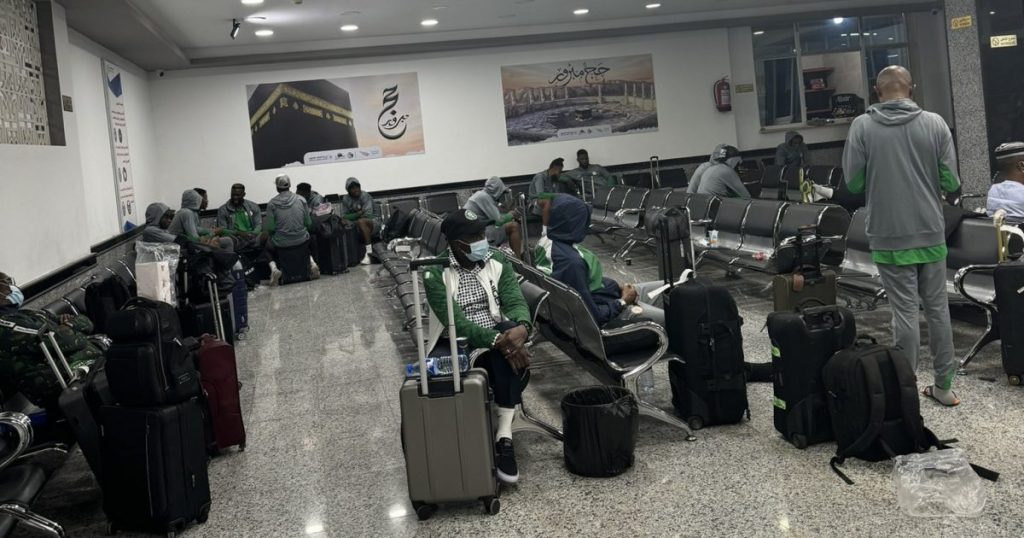Nigerian football stars Victor Osimhen and Stanley Nwabali have publicly voiced their dissatisfaction concerning the treatment of the Super Eagles during a recent ordeal at Al Abraq International Airport in Libya. Osimhen, in a striking post on social media, described the handling of the national team as “inhumane” and articulated his disappointment at the lack of professionalism displayed towards his fellow players and coaches. He emphasized that such experiences contradict the essence of sportsmanship, fostering a sense of injustice among the team members. Osimhen underscored that despite these challenging circumstances, solidarity remains among the team, encouraging the athletes to remain resilient and united against adversity.
In his post, Osimhen called for immediate action from the Confederation of African Football (CAF) and other relevant football bodies to address the situation. He highlighted the fact that his teammates and coaching staff were still stranded at the airport, voicing concerns that the treatment they experienced was both unacceptable and unsuitable for a national team representing Nigeria. His appeal for support underlined the urgency and seriousness of the situation, indicating that athletes deserve better treatment regardless of their location or circumstances. Osimhen’s passionate plea reflects a broader sentiment among athletes who seek not only fair treatment but also a standard of care befitting their status as representatives of their nation.
Stanley Nwabali mirrored Osimhen’s sentiments by sharing his outrage on social media, revealing the dire conditions under which the Super Eagles were forced to endure their 14-hour wait at the airport. Nwabali described the circumstances as “absolutely crazy,” emphasizing the lack of basic necessities such as food, water, and internet access during this extended period of confinement. His stark depiction of the ordeal served to highlight the profound disrespect shown to a national team while on duty. The urgency of his message included a direct appeal for CAF intervention, aligning with Osimhen’s call for immediate remedial action, which illustrates the frustration felt by the players regarding the helplessness of their situation.
Another player, Victor Boniface, joined the conversation, articulating his own discontent with the conditions experienced at the airport. His observance of spending nearly 13 hours without food, Wi-Fi, or a proper place to rest added to the narrative of hardship faced by the Super Eagles. This collective sharing of grievances across social media platforms underscores a growing awareness of the challenges faced by African teams while traveling and the need for greater support from governing bodies. The athletes are clearly advocating for improvements not just for themselves, but for future generations of players who may find themselves in similar circumstances during international duties.
The incident unfolded as the Nigerian delegation was en route to Benghazi for a crucial qualifier, which highlights the importance of maintaining proper travel logistics for national teams. Reports indicate that the chartered flight was unexpectedly diverted to Al Abraq, an airport not typically used for commercial aviation and primarily serving hajj operations. This left the Super Eagles abandoned and without any support from the Libyan Football Federation, who failed to arrange transportation or provide assistance even after hours of waiting. This lack of coordination and oversight points to systemic issues within the infrastructure that supports international football in Africa, raising substantial concerns about the preparedness and responsiveness of local football federations to support visiting teams.
While the unfortunate incident highlights the immediate concerns of the Super Eagles, it also calls into question the broader standards of care for African teams on international assignments. Criticism has been directed not only toward the Libyan authorities but has also raised alarms regarding the oversight responsibilities of CAF. As of now, despite the vocal outcry from players and the media coverage, there has been no response from CAF addressing the players’ grievances or outlining steps to remedy the situation. The implication of inaction from football authorities signals an alarming disconnect between governing bodies and the players they represent, which could have broader implications for the recognition of the challenges faced by teams in the African football landscape.
In summary, the plight of Victor Osimhen, Stanley Nwabali, and their Super Eagles teammates at Al Abraq International Airport serves as a stark reminder of the logistical challenges that African football teams often face. The athletes’ collective voices demonstrate a shared desire for accountability and improvement within the structures governing African football. Their experience spotlights ongoing issues of inadequacy in organizational support during international travels, urging the need for reforms to ensure a better experience for national teams in future engagements. The outrage and disappointment expressed by the players not only reflect their immediate personal grievances but also symbolize a broader call for systemic changes within African football to safeguard the welfare of its athletes.














